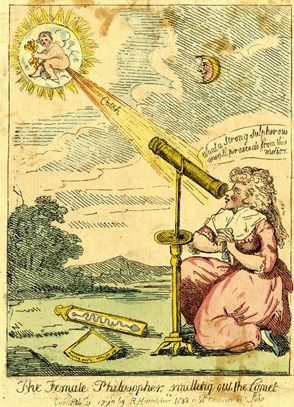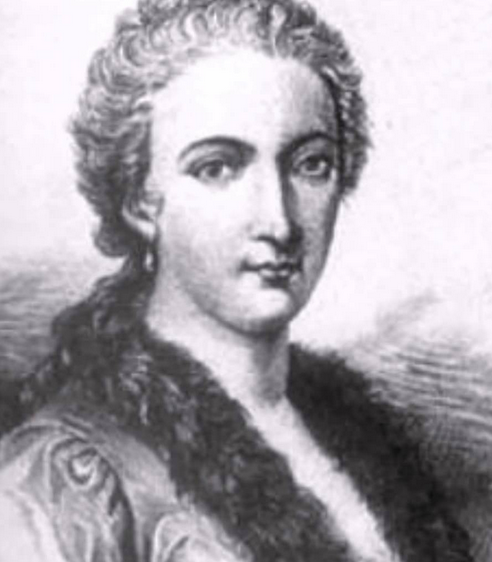As you know, the theme of my blogs is women doing things that were thought unsuitable. Today’s story is of a woman who ‘played the game’, living a respectable domestic life, but in her spare time discovered comets. And even though she presented each of her findings in deferential, timid letters, she made sure she got the credit she was due.
Caroline Herschel was born in Hanover in 1750, the eighth child of a musician. At the age of ten she contracted typhus, which stunted her growth – she only reached an adult height of four feet three inches – and suffered vision loss in her left eye. Her ageing parents assumed she would never marry and so brought her up to look after them and her brothers. Although she was taught mathematics, it was only to enable her to manage the household expenses.
By contrast, her brother William, led a life free of restrictions and moved to England to pursue his interest in music. When Caroline was 22, following her father’s death, her brother suggested she join him there. She learned to sing and play the harpsichord, and took part in William’s performances. But she struggled to fit in with the local society, and made few friends. William also taught Caroline more maths, but only cautiously – ‘a little algebra for Lina.’ William loved to share his interests with Caroline, and soon she’d become fascinated by his new hobby: astronomy. In 1781 William discovered the planet Uranus, for which he was rewarded with a pension from George III on condition that he moved to Windsor and gave up music. Caroline reluctantly became William’s housekeeper and assistant, later complaining that “I did nothing for my brother but what a well-trained puppy dog would have done, that is to say, I did what he commanded me.” But Caroline was dutiful, putting her brother’s needs first during the day. It was during her solitary nights with her telescope that she first discovered a comet. And despite her humble claims that she wanted to publish her finding to advance astronomy, she was keen to take credit for it, presenting her findings as quickly as possible by writing to an influential friend. Recognising her achievements, George III paid her a modest salary as William’s assistant, making her the first woman to be paid for her contribution to science.
A year later, William married, fracturing the brother-sister relationship and causing Caroline to move into lodgings. This independence allowed Caroline to become well known as a comet hunter and, in some circles, a figure of fun, as this caricature shows.

She discovered seven more comets, each accompanied by her trademark self-effacing letters, using phrases like: “a woman who knows so little of the world ought not to aim at such an honour, but go home, where she ought to be, as soon as possible.” In the case of her eighth comet, she even rode her horse 30 miles through the night, to Greenwich to announce her discovery to the Astronomer Royal, to ensure she would be credited with the discovery.
After her bother’s death in 1822 she returned to Germany and continued to work. She was the first woman to be paid for her contribution to science, to be awarded a Gold Medal of the Royal Astronomical Society and to be named an Honorary Member of the Royal Astronomical Society. She remained active until her death at the age of 97.

